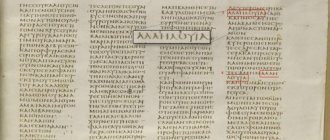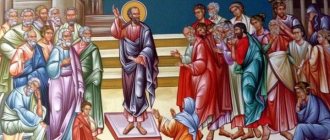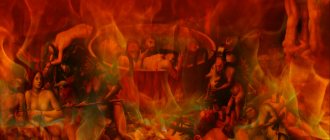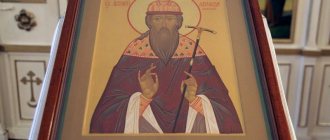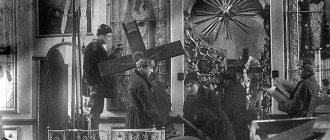Meaning of the term and its synonyms
The first attempts to justify the Christian worldview judiciously and consistently belong to apologists.
Apologist, translated from Greek, means defender, a person who speaks defensively of something or someone. This word can also be translated as intercessor, patron, supporter, adherent, fighter, praiser, admirer, exalter, zealot.
Useful materials
Apologists are early Christian writers, successors of the apostles, who defended Christianity before pagan philosophers. They are considered pioneers in Christian theology, and apologetics is the first genre of patristic (patristic) literature, a section of Christian theology devoted to confirming the truth of doctrine using rational means.
Interesting fact
For the first time this term was used in relation to early Christian writers in the 2nd and 3rd centuries.
APOLOGETICS
(from the Greek ảπολογία - defense, justification) - in the narrow sense of the word - the Church Fathers of the 2nd century, who defended
Christianity
before the imperial power and refuted the prejudices of an educated pagan society; in a broader sense, Christian authors also from the 3rd–5th centuries, who fought against paganism in their writings. Apologists are the first theologians of the Christian world, and apologetics can be considered the first genre of patristic literature, the specificity of which is that it has a precisely fixed beginning and does not have a definite ending.
The task of the apologists was to: ward off accusations from Christians; achieve a tolerant attitude towards the Christian religion on the part of the state; in comparing Greek philosophy with Christian thought to prove the truth and superiority of the latter. The beginning of the literary activity of apologists was the moment when Christianity decided to emerge from isolation and present itself as the highest realization of the cultural aspirations of society. In this sense, apologetics is not the “Hellenization of Christianity,” but a full-fledged dialogue with pagan philosophy, in which Christianity mastered its conceptual language and transformed it in a religious and theological key. In addition, apologetics proposed to comprehend all previous wisdom as a step on the path to the truth, which was revealed by Christ and which Christianity embodied.
Apologists addressed not only members of the Church as apostolic men, but also non-Christians. The apology was written in the form of a speech or dialogue, compiled according to all the rules of classical rhetoric, and was originally intended for wide dissemination. The model for apologists was the defense of Socrates before the Athenian court; they sought not only to ward off hostile accusations of incest, infanticide and cannibalism, generated by rumors of secret Eucharistic meetings, but also to prove the absurdity and immorality of pagan myths, contrasting them with the true teaching of monotheism
and resurrection. The arguments in favor of the truth of Christianity were as follows: 1) the high morality of Christians (the commandment of love for one's neighbor); 2) predictions of the prophets about Christ; 3) internal unity between the Old and New Testaments: Christianity is older than paganism, since Moses is older than the Greek poets and philosophers; 4) the miracles of Christ are opposite to the miracles of magicians who acted with the help of the power of demons. In addition to the anti-pagan direction of apologetics (Justin, Tatian, Athenagoras, Theophilus of Antioch, Melito of Sardia, Minucius Felix, Tertullian), there is a direction of anti-Jewish criticism based on biblical exegesis (Ariston, Justin), as well as an anti-gnostic direction (Justin, Theophilus of Antioch, Tertullian), already associated with intra-church dogmatic distinctions.
In theoretical terms, among apologists the central place is occupied by the problem of the relationship between the transcendental God and hypostases
.
Borrowing their concept of God from Platonism
, apologists brought it closer to the biblical God.
Their definitions of origin are, as a rule, apophatic: incomprehensibility, ineffability, the transcendence of the world. Based on the prologue to the Gospel of John, the apologists developed their Christology
, the core of which was the idea of
Logos
, which is more cosmological than theological in nature.
Logos (Mind, Sophia
), the second hypostasis, as the potency eternally present in the original, becomes energy and reveals itself only in the act of creation of the world.
According to this view, which reveals the influence of Aristotle, the Logos turns out to be substantially subordinate to the Father (subordinationism), who produces Him from Himself as a mediator between Himself and the world. Carrying this relation into the anthropological realm, apologists attempted to clarify it through the Stoic distinction between the "inner" and the "spoken word." Apologists also taught about the "seminal Logos" (another Stoic term) - an intelligent principle that is present in all things and forms the inner law of the universe. In the soteriology
of apologists, its embodiment in man is considered as the most perfect manifestation of the Logos, opening up the possibility of
salvation
.
In general, Greek apologists of the 2nd century. determined the development of Christian dogma (Christology and triadology), however, starting with Irenaeus of Lyons, the Church Fathers were looking for ways to overcome the tendencies of rationalism and subordinationism characteristic of early apologetics. The Corpus apologeticum opens with the apologies of Codratus and Aristides, addressed to the emperor Hadrian in 125. Next in the series are the works of Ariston of Pellus (the unsurvived “Dialogue of Jasson and Papiscus,” c. 140), who, through the mouth of the Judeo-Christian Jasson, proved the divinity of Christ on the basis of the Old Testament, and Justin the Philosopher and Martyr, one of the most significant apologists. The latter, in his two “Apologies”, large and small, addressed to Antoninus Pius (150/155) and Marcus Aurelius (c. 161), refutes accusations against Christians, sets out the content of the Christian religion and proves the divinity of Christ on the basis of Old Testament prophecies. Without opposing faith and knowledge, Justin considers the best Greek philosophers to be the disciples of Moses and the predecessors of Christians (a tradition that goes from Philo of Alexandria to Clement of Alexandria). In his Dialogue with Tryphon the Jew, Justin shows that Jewish law has only a temporary meaning and that the veneration of Christ does not contradict the belief in one God. Tatian in his “Speech against the Hellenes” (up to 161) takes a sharply negative position in relation to the entire Greek culture; in theology he is strongly influenced by Justin. Athenagoras the Athenian, one of the most profound apologists, the author of the “Petition for Christians” (c. 177) and the treatise “On the Resurrection of the Dead,” in which he provides rational arguments in favor of monotheism and the resurrection; avoids subordinationism, affirming the essential unity of hypostases. Theophilus of Antioch in three books “To Autolycus” (after 180) speaks about the knowledge of God, about the Trinity, about the Logos (the internal Word and the spoken word), about the Fall and salvation, the superstition of the pagans and the wisdom of the prophets. Melito of Sardis, who wrote the apologia “The Word of Faith” (c. 172), is known for his treatise “On Easter,” which introduced the Asia Minor tradition of celebrating Easter. The treatise raises the problems of the relationship between the two Testaments, Christology and soteriology. The author of the anonymous “Epistle to Diognetus”, from a moral and practical standpoint, explains to the pagan the main provisions of Christianity, answering questions about its difference from other cults, about the meaning of love for one’s neighbor, about the age of his religion. Written in good style and with great care, the “Epistle” is one of the best monuments of early Christian literature. This series is closed by less significant apologists who wrote at the very end of the 2nd century: Hermias (“Mockery of External Philosophers,” c. 200), Miltiades and Apollinaris of Hierapolis. African apologetics, which is also the beginning of Latin patristics
, represented by the names of Minucius Felix and Tertullian. Minucius Felix's dialogue Octavius is a collection of conventional apologetic arguments, but it stands out as an example of rhetorical art. Tertullian wrote several apologetic works: two books “Against the Pagans” (197), containing moral and religious objections, “Apologeticus” (con. 197), considering exclusively political accusations against Christians, as well as “On the Testimony of the Soul”, “To Scapula” and “Against the Jews,” which teaches that even the Gentiles share in God’s mercy and that the Old Covenant of retribution must give way to the New Covenant of love.
In the East, the critical line of apologists in the 3rd century. continued by Clement of Alexandria and Origen (“Against Celsus”), in the 4th century. – Eusebius of Caesarea, who supplements the early apologists with many facts borrowed from ancient literature and history, and Athanasius of Alexandria (“Against the Pagans”); in the 5th century it concludes with “Healing of Pagan Diseases” by Theodoret of Cyrus. In the West, this line was continued in the 4th century. Lactantius (“Divine Instructions”) and in the 5th century. – Augustine (“On the City of God”).
Sources:
1. Justin the Philosopher, St.
Op. M., 1892;
2. Athenagoras the Athenian.
Intercession for Christians. – “Bulletin of Ancient History”, 1993, Appendix, p. 237–279;
3. Tertullian.
Favorite op. M., 1994;
4. Origen.
Against Celsus, trans. from Greek L. Pisareva. B. m., 1996;
5. The Early Church Fathers: An Anthology. Brussels, 1988;
6. Fathers and teachers of the church of the 3rd century. Anthology, vol. 1–2. M., 1996;
7. Theophili episcopi Antiochensis, Libri tres ad Autolycum. A Diognete. – “Sources chrétiennes” (P.), 1971, No. 172;
8. Hermias.
Satire des philosophes païens, 1993. – Ibidem, No. 398.
Literature:
1. Reversov I.P.
Defenders of Christianity (Apologists). St. Petersburg, 1898;
2. Spassky A.
Hellenism and Christianity. Sergiev Posad, 1914;
3. Neretina S.S.
Believing mind. On the history of medieval philosophy. Arkhangelsk, 1995;
4. Sidorov A.I.
Patrol course. M., 1996, sect. 2: Greek apologists of the 2nd century;
5. Chadwick H.
Early Christian thought and the classical tradition. Oxf., 1966;
6. Harnack A.
Lehrbuch der Dogmengeschichte, Bd. I. Tüb., 1905;
7. Pepin J.
De la philosophie ancienne à la théologie patristique. L., 1986.
AMMikhailovsky
The main task of Christian apologetics
With the beginning of the spread of Christianity, the need arose for a deep justification of the Christian doctrine in the face of the pagan world, as well as for protection from attacks and accusations from the Jews. This was especially true in the first centuries, up to 325, when mass persecution of Christians was quite frequent. A Christian was accused of committing an atrocity against religion if he refused to participate in the service of idols. His religion was called illicit and his congregations “unlawful assemblies.” One of the most incredible accusations was that Christians were accused of cannibalism: they allegedly feed on the human body and “bread soaked in blood.”
Christians were forced to defend themselves, to protect themselves from the reproaches of the authorities and pagan intellectuals. They appealed to the authorities, in the hope of an impartial trial. At the same time, they tried to prove that what pagan minds say about them is unfair and absurd. Christian writers and apologists took on the role of intercessor.
The main tasks of the apologists were to:
- debunk all accusations of pagans and Jews;
- show the Roman government their loyalty, the sublimity and integrity of the moral education of Christians, their virtue and honesty;
- with the help of intellectual, moral, cultural and other generally accepted norms and criteria, provide a justification for the Christian worldview, i.e. rational and philosophical proof.
In the New Testament
The beginnings of Christian apologies can be seen in the Gospels, in the Apostolic Acts and Epistles.
Sermon of the Apostle Paul. Mosaic
Apology is found especially often in the writings of the Apostle Paul. Preaching to nations who believed in idols, the Apostle Paul naturally had to begin apologetic reasoning. The apologia is his speech from the Seventeenth Chapter of the Book of Acts in the Greek Areopagus. In Lystra, with his sermon, he exposes idolatry, explains in simple words and examples that there is a true God - the Creator (Acts 14: 6-20). In Philippians 1:7, the Apostle Paul says his mission is to “defend and establish the gospel.” Preaching cannot be separated from defense.
In his first letter to the Corinthians, Paul presented the testimony of the Christian faith - the confirmation of witnesses to the Resurrection of Christ:
“For I taught you from the beginning what I also received, that is, that Christ died for our sins according to the Scriptures, and that He was buried, and that He rose again on the third day, according to the Scriptures, and that He appeared to Cephas, then to the twelve; Then he appeared to more than five hundred brethren at one time, most of whom are still alive, and some have died; then he appeared to Jacob, and also to all the Apostles; and last of all he appeared to me also, as to a certain monster” (1 Corinthians 15:3-8).
Titus 1:9 talks about the importance of being able to demonstrate the authenticity of the Christian faith to church leaders. The priest must be “one who adheres to the true word, consistent with doctrine, so that he may be able to teach sound doctrine and to reprove those who resist.”
The Epistle of Jude says in verse three:
“Beloved! Having all the zeal to write to you about the common salvation, I considered it necessary to write to you an exhortation - to strive for the faith that was once delivered to the saints.”
He taught people who had been attacked by false teachers; to defend their faith as revealed in Christ.
The Apostle Peter expressed the idea of the need to be able to understand and defend one’s faith very clearly in his First Epistle 3:15:
“Sanctify the Lord God in your hearts; Be always ready to give an answer to everyone who asks you a reason for the hope that is in you with meekness and reverence.”
Late apologetics
In early times, apologetics opposed paganism, in the Middle Ages - against Judaism and Islam, now - against atheism.
In the first centuries of Christianity, believers were accused of wanting to destroy the state and promoting debauchery and infanticide. The very idea of monotheism was considered blasphemy. The first Christians were subjected to terrible torture: they were burned alive, given to be eaten by wild animals, and buried alive in the ground. They were considered representatives of sects, and Christ was considered a deceiver. Thanks to the first apologists, Christianity survived and gave the world its greatest culture.
After Christianity officially acquired the status of a religion, the fight against pagans ceased to be the main goal of apologetics, since they became practically powerless. After this, the activity of defense writers began to fade. The place of the first apologists was taken by fighters against heresy and dissent.
Discussions about the historicity of Jesus Christ are one of the tasks of apologetics
Now a difficult time has come for Christians - on the one hand, there is godlessness, the popularization of atheism, on the other, there is an abundance of totalitarian sects, because there are more and more new groups every year. This requires the activation of apologists for Orthodoxy.
It is sometimes said that apologetics is unnecessary because accepting a belief is a voluntary act. Whoever wants to will come to faith despite difficulties. The task of apologetics in the modern world is to prove that the Holy Scriptures do not contradict scientific data and to support wavering minds.
The first Christian thinkers and apologists
From the beginning of the 2nd century. For the first time, slander against Christians arises from pagan philosophers. But at the same time, scientists and intelligent people began to convert to Christianity, and they became the first literary fighters against the pagan world.
Interesting fact
Most early Christian apologists were converts from paganism.
Having converted to Christianity, they applied their acquired knowledge and experience of intellectual battles, oratory and literary processing of speech. Literary works began to appear, written with the aim of protecting believers from attacks and defending the faith. These apologetic works were first directed at a pagan, outside listener who was intellectually superior to the Christian.
Eastern
The earliest Greek-language apologies were published around the middle of the 2nd century. Marcian Aristides and Codratus. They are considered to be the first Eastern apologists, although very little information about them has been preserved. Their works have not survived either. Only an excerpt from Codratus’ Apology to Emperor Hadrian has reached us:
“The deeds of our Savior were always obvious, for they were true: the people whom He healed, whom He raised from the dead, were seen not only at the moment of their healing or resurrection - they were always in front of our eyes, not only when the Savior was on earth, but also lived long enough after His Resurrection, and some have survived to this day.”
Justin Philosopher
Holy Martyr Justin the Philosopher
The most prominent figure in the development of writing of ancient Christians and the most significant among the apologists of Greece in the 2nd century. was the martyr Justin the Philosopher. Some researchers consider him the founder of apologetics. He was born, raised and received an excellent education; many philosophers were his teachers. He himself taught rhetoric for some time. But all this did not give him mental and moral satisfaction.
After lengthy attempts to find the truth, Saint Justin converted to Christianity, was baptized, and, without taking off his “philosophical cloak,” devoted the rest of his life to missionary work. He moved to Rome when Antoninus Pius was emperor, and wrote his famous apological works there. In the first apology, he addresses the ruler Antoninus Pius as a pious philosopher. In it, he refutes all the absurd accusations of pagans against Christians of immorality and everyday crimes.
He explained that punishing Christians for just their name is stupid and unfair, that Christians lead a pure and immaculate lifestyle. It tells about Christian doctrine and calls for a fair conclusion about the faith of Christ. The first apology included an interpretation of the teachings of Christ and a description of the sacraments of Baptism and Communion:
“We call this food the Eucharist (thanksgiving), and no one else is allowed to participate in it except the one who believes in the truth of our teaching and has been washed for the remission of sins and for regeneration, and lives as Christ did.”
The Second Apology is addressed to the Roman Senate and is considered a continuation or addition of the first. It is much shorter and looks unfinished. The writing of the second apology was prompted by the tyranny of the pagans, from which Christians suffered.
Another creation of Justin the Philosopher is “Dialogue with Tryphon the Jew.” In terms of content, it is the largest, differs from other works in character and genre - it is written in the form of a conversation between a Christian and Jews.
Tatian
Tatian
Disciple of the martyr Justin Tatian (c. 120–185). He, like his teacher, tried for a long time to find the truth until the Gospel fell into his hands. He saw the spiritual life of Christians and was struck by their willingness to die for their faith. He converted to Christianity and, imitating his teacher, began to preach and defend Christianity. In his "Speech against the Hellenes" he very emotionally defends faith in Jesus Christ:
“We are not mad, Greeks, and we are not talking nonsense when we preach that God was born in the form of a man.”
Theophilus
Theophilus (2nd century), Bishop of Antioch also came to Christianity from pagans. Under the influence of prophetic books, he accepted Christianity and became its ardent defender and confessor. Unfortunately, his apological works have not survived, except for one - “Epistle to Autolycus”, consisting of three parts.
Interesting fact
It is in the work of Theophilus that we first encounter the use of the concept of the Trinity: “... the three days that were before the creation of the luminaries are images of the Trinity, God and His Word and His Wisdom.”
Western
Early Christian Latin-speaking apologists appeared much later than their Greek comrades - at the end of the 2nd century. The ones who worked the most were Minucius Felix, Irenaeus of Lyons and Tertullian.
Marcus Minucius Felix
Marcus Minucius Felix, like many, was born into a pagan family, received a comprehensive education and became a lawyer. He came to Christianity as an adult, amazed at the steadfastness of the Christian faith in the face of such an onslaught of pagans. The only work that has survived to this day is the apology “Octavius”, written in the form of a dialogue in which three persons participate - a pagan, a Christian and Minucius Felix himself, as an arbitrator.
Irenaeus of Lyon
Sschmch. Irenaeus of Lyon
Irenaeus of Lyons, unlike many of his like-minded people, was born into a Christian family. He received an excellent education, was a pupil of the holy martyr Polycarp of Smyrna, and studied both the Holy Scriptures and the works of pagan authors. His most famous work is called “Against Heresies.” In it he enters into an argument with Gnosticism.
“And again David speaks about the death and resurrection of Christ like this: “I lay down and fell asleep, I arose, for the Lord protected me” (Ps. 3:6). David did not say this about himself, since he did not rebel after he died; but this is the Spirit of Christ, who through other prophets, and in the present case through David, speaks of Him: “I lay down and fell asleep, I arose, for the Lord protected me. By sleep he means death, for He has risen.”
Tertullian
Tertullian (160-220) was one of the most prominent Western apologists. Quintus Septimius Florence Tertullian also came from a pagan background, studied in the best educational institutions, and became a lawyer. At the age of 35, he received holy Baptism and completely devoted himself to the defense of Christianity. Tertullian denied philosophy, considered it a harmful teaching and the source of all heresies. In his opinion, the Gospel should be taken literally, without trying to find some hidden meaning in it.
The Apologetic is his quintessential apologetic work. In it, he states that faith in God is an integral part of human existence, because the human soul is “by nature Christian.” He also wrote many collections: On prayer, On patience, On spectacles, On women's attire, On baptism.
“For the law of baptism was given and its form was prescribed. Go, says Christ, and teach the pagans, baptizing them in the name of the Father, Son and Holy Spirit (Matthew 28:19). The following definition is consistent with this law: Unless one has been reborn of water and the Spirit, he will not enter the Kingdom of Heaven (John 3:5); it links faith with the necessity of baptism. Thus, from then on all believers began to be baptized.”
After the Roman state under Constantine I entered into an alliance with Christianity (Edict of Milan 313, First Ecumenical Council 325), the goal of the apologists’ activities was achieved, the defense of Christianity from paganism ceased to be a necessity, the apologetic genre of writings was eventually replaced by polemical literature against heresies.
Meaning of the word apologist
Opposing apologists (an apologist is someone who defends an idea) of today’s giant power plants also love this slogan, as an example of the obvious incompetence and short-sightedness of the “greens”: “If they sit in the dark, they say, they will sing differently” [2].
The theater of Palleron and Sardou was created for her, poetry was created for her by the apologist for petty feelings and everyday life Coppe and his comrade, the crude materialist and skeptic Richpin, Aune began to write his novels for her, and helped her a lot to strengthen herself on the basis of determinism, the cornerstone of her worldview, which brings personal will to zero and making everything dependent on the concatenation of causes, an ardent preacher of determinism and a strict materialist Zola.
Entirely belonging to the Elizabethan era, the prominent theologian and apologist of the Church of England Richard Hooker (c.
At the beginning of the twentieth century, a true revolution in music was made by the bold experimenter Scriabin, an apologist for synthetic art, who stood at the origins of light music.
Vasily Klyuchevsky, not at all an apologist for Paul, who considered him a “morally abnormal king,” nevertheless found positive aspects in the reign of this emperor.
He, the all-seeing seer, the apostle and apologist of impeccable logic, the Sherlock Holmes of deduction, was lost in the face of what was called abstraction and metaphor.
Yes, “Brecht _was a communist_,” his English apologist admits with the courage of despair, but only in order to literally, separated by commas, triumphantly report: and yet “many of his works turned out to be unacceptable to the party as communist propaganda” {Martin Esslin, Brecht: the Man and his Work, p.
Not giving themselves the trouble to comprehend Lomonosov’s poetry as a whole, not wanting to find in it the very hidden spring of the notorious “soaring”, these people (whose leader in the 1750s was none other than the recent apologist of the “Russian Pindar” - Sumarokov), without suspecting it, they fought not with Lomonosov, but with their own limited idea of Lomonosov.
When unpublished translations of his articles and books began to circulate - and this began in 1961 - readers who knew from hearsay that he was a preacher and apologist were often surprised at his impermissible ease.
Firstly, Ambrose demanded that he answer those arguments of Celsus that Origen himself seemed not worth attention (II, 20); secondly, the apologist considered it necessary, for the sake of persuasiveness, “not to leave without examination any of his statements, especially in those cases where his accusations might seem reasonable to some of us or among the Jews” (V, 1); thirdly, he wanted to show that he was completely objective and valued only the truth (III.16); finally, he is afraid that he will not be suspected of keeping something quiet, and therefore is even ready to repeat himself, since Celsus repeats himself (II, 46).
Contribution to the development of theology
Through their activities, early Christian apologists took the first steps towards the emergence of Christian theology and terminology. For example, Theophilus of Antioch and Tertullian used the concept of the “Trinity”. Despite the fact that their works did little to stop the persecution of Christians, in general, their writings were of high value in shaping the self-awareness of the Church of Christ. The so-called ecumenical teachers - Basil the Great, Gregory the Theologian, Gregory of Nyssa and many others - were strongly influenced by the first apologists and borrowed a lot from them.
Goals of Apologetics
Apologetics always corresponds to the currents of time, choosing with its problems what is most relevant at the moment:
- designed to expose pseudoscientific attacks on Christianity;
- seeks ways to protect Christian society;
- strives for a deeper understanding of the Holy Scriptures.
This is interesting! In early Christian apologetics there were two directions - towards Jews and pagans. Afterwards, apologetics was aimed at eradicating the distortion of faith within Christianity itself, at preserving the purity of beliefs and morality of believers.
Attitude to pagan culture and philosophy
The culture and philosophy of the pagans found an ambivalent attitude among apologists. In clashes with paganism, such apologists as Tertullian and Tatian allowed themselves offensive, biased statements towards pagan philosophy and civilization as a whole. They believed that Christian doctrine had nothing to do with philosophizing, that the study of this science was unnecessary and even destructive for faith. “What do Athens and Jerusalem have in common?” (Tertullian. Refutation of heresy. 7). Tertullian considered all philosophical schools to be alien to Christianity.
On the contrary, Justin the Philosopher and his other like-minded people believed that Christianity and philosophy have a common beginning. Christian views are found in some philosophical views. “Everything that is said good by anyone belongs to us Christians” (Justin. Apol. II 13). They had no intention of increasing hostility between paganism and Christianity, but, on the contrary, to find common ground between them and make it easier for pagans to understand Christianity.
Activities of early Christian apologists
The first apologists came from the elite of society. They defended the tenets of faith from the criticism of Jewish philosophers and supporters of paganism.
Fronto, the emperor's mentor, is considered the main opponent of the first Christians. He considered the beliefs of believers absurd, based on prejudices and fanaticism. Such views could destroy the familiar ancient world, so opponents of Christianity tried to prove that the new religion was hostile. Apologists sought to convey to society the truth and acceptability of their religion.
Read also: How to sew a blouse with your own hands (71 photos)
Important! The activities of the defenders were able to weaken the persecution of the authorities and prepare society to accept the new religion.
Usage of the term today
Nowadays, the word “apologist” can be used in any field - in literature, economics, politics. An apologist can be any person, not only a Christian, a follower of any teaching, defending some idea, theory...
Conclusion
The works of apologists remain necessary and useful for the modern reader. Every Christian should know his faith well and be able to give an answer about his “hope.” For this, it is very useful to get acquainted with the thoughts of authors who lived in the 2nd-3rd centuries AD, who spoke out in defense of Christ in the face of the Jewish and pagan world.
Author: Olga Timashova
How exactly did apologists defend the Christian faith?
Apologists tried to refute the slander leveled against Christians and give an answer to those who accused the Church of being a threat to the state. Emphasizing the high moral qualities of Christians, apologists argued that their faith contributed to the peace and well-being of both the emperor and the state, and society as a whole. Apologists also refuted the accusations of monstrous crimes (atheism, cannibalism, Oedipal incest, etc.) leveled at Christians, proving their impossibility and absurdity. Thirdly, apologists revealed the absurdity and immorality of paganism, its mythology and deities and argued that Christianity has the only true teaching about God and the world. They not only refuted the arguments of philosophers, but showed that their philosophy itself, having the only justification for human reason, cannot achieve truth to the extent that it is achievable in Christianity. At the same time, noting the parallels between pagan philosophy and Christian thought, many early Christian apologists presented philosophy as the predecessor of Christianity, and Christianity as a revelation of what philosophy only anticipated. At the same time, apologists actively used the conceptual apparatus and some ideas of ancient religion and philosophy, using them (for example, the Stoic doctrine of the Logos) to substantiate the Christian faith in the face of their pagan contemporaries. And, finally, the apologists revealed to the pagan world the Christian understanding of the Holy Scriptures, while dissociating themselves from the “old Israel” - Judaism.
Literature
- Apology // Encyclopedic Dictionary of Brockhaus and Efron: in 86 volumes (82 volumes and 4 additional). - St. Petersburg, 1890-1907.
- Apologists and apology // Jewish Encyclopedia of Brockhaus and Efron. - St. Petersburg, 1908-1913.
| : Incorrect or missing image | To improve this article it is desirable:
|

